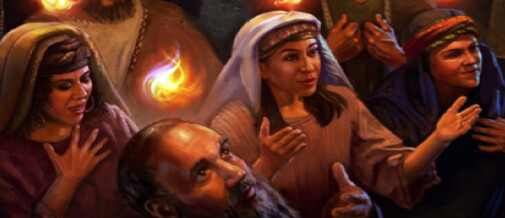
Seven years ago, just a few days before we celebrated what we are celebrating today—Pentecost—we were very much like the disciples in today’s gospel. They locked themselves in the Upper Room out of fear. Similarly, we locked ourselves in our houses for the same reason—fear. A young man had killed three Mounties and was still on the loose. Thank goodness events of that magnitude are rare. What was not so rare in Jesus’ time, and still in our time, is this lingering fear. The most common repeated phrase in the entire Bible is: “fear not” or “do not be afraid.” Interesting enough it is repeated 365 times, once for every day of the year. Perhaps it is indicative of how much fear and anxiety have permeated each of our lives, every day. Fear, not unbelief, is the great enemy of faith.
While the disciples were huddled together, they were not really in communion with each other, nor was there any life flowing out of them. They were a group of frightened individuals trying to console each other. But through the locked doors appears the Risen Lord who twice says to them, “Peace be with you.” He is offering them a peace the world cannot give. What’s wrong with the world’s peace? It has no lasting power. It lasts only until fear resurfaces, and the next insult or missal is launched at the one we are convinced is our enemy. Jesus wants to give us a peace the world cannot give and, equally important, a peace the world cannot take away.
If you read the creation story from the Book of Genesis, you will notice that with God’s breath all things were created. Until God breathed and spoke, all we had was chaos, disorder; nothing had meaning or purpose. The pinnacle of creation is when God created human beings by breathing the breath of life into something dead, the clay of the earth. This was Spirit encountering matter. Whenever Spirit and matter come together, new life emerges. It was true with our first parents, and it is still true with us today. Every breath we inhale comes from God first exhaling. Every one of us lives by a life beyond ourselves.
When the Risen Lord appears to the disciples huddled in fear in the Upper Room, he did not take away the chaos of their lives (and their lives were total chaos at that point), but he inserted himself into the middle of the chaos and breathed his Spirit. This is what the Risen Lord delights in doing, inserting himself into the chaos of your life: the job that is no longer fulfilling, the marriage that is hanging on by a thread, the stress of parenting, the pain of loneliness, job insecurity, the chronic sickness and pain that people live with each day—into that chaos the Lord inserts himself and breathes peace.
Twice Jesus says, “Peace be with you.” The first time he offers peace is to take away the disciples’ fear. Interestingly, the number one fear of people, worldwide, is “public speaking.” The number two fear in people is “death.” In other words, given the choice, we would rather be the person in the coffin at the funeral than the person giving the eulogy at the funeral. Interestingly again, once the disciples receive the promised Spirit, they become emboldened public speakers and they no longer fear giving up their lives. They have overcome humanity’s two greatest fears. So, the first time Jesus says, “Peace be with you” is to dispel fear.
The second time he offers peace is not to rid them of fear; it is to send them on a mission. The very next line, after he says, “Peace be with you” for the second time is, “As the Father sent me, so I send you.” He is sending them and, by extension, us on a mission. Here comes the mission: “If you forgive the sins of any, they are forgiven them.” This is not just the role of the priest in the sacrament of reconciliation; this is the role of every one of us.
First the disciples have their fear taken away, and then they are sent on a mission. Spirit is needed for both. Violence begets more violence. Don’t take my word for it. Watch the evening news or pick up the newspaper any day of the week, and you will agree that violence begets violence. However, peace also begets more peace. It has a ripple effect. I love what a certain Russian proverb says: “Those who have the disease called Jesus will never be cured.” Like a pebble dropped into water, once the rippling effect starts, you cannot stop it.
Jesus breathed out his peace and forgiveness in the Upper Room in Jerusalem 2, 000 years ago and somehow it reached us here in little New Brunswick. I think that is why those 15 places were mentioned in the first reading from the Acts of the Apostles, places like Phrygia, and Pamphylia, and Cappadocia. You can add your hometown to the list. All those places form a circle around Jerusalem. What is Jerusalem? The place of Jesus’ death and resurrection; the place where the pebble was dropped in the water; the place of the first Pentecost. From there the Spirit ripples outward through all these towns and villages eventually to all the corners of the world.
Spirit cannot be possessed, only received and given away. When you receive it and give it away, it multiplies, it ripples outward. In that moment you have become a conduit, a channel. Perhaps that is why the Risen Lord appeared with the holes still in his hands, feet and side. He is God’s perfect channel. Out of his wounds flow his Spirit. The wounds are the escape hatches through which Spirit flows into your life and from your life into the life of the world.
Fr. Phil Mulligan
MAY
2021

About the Author: